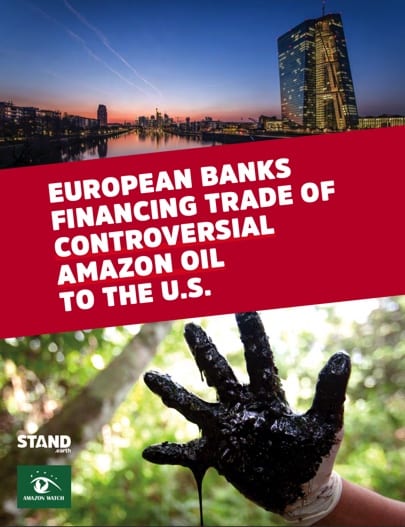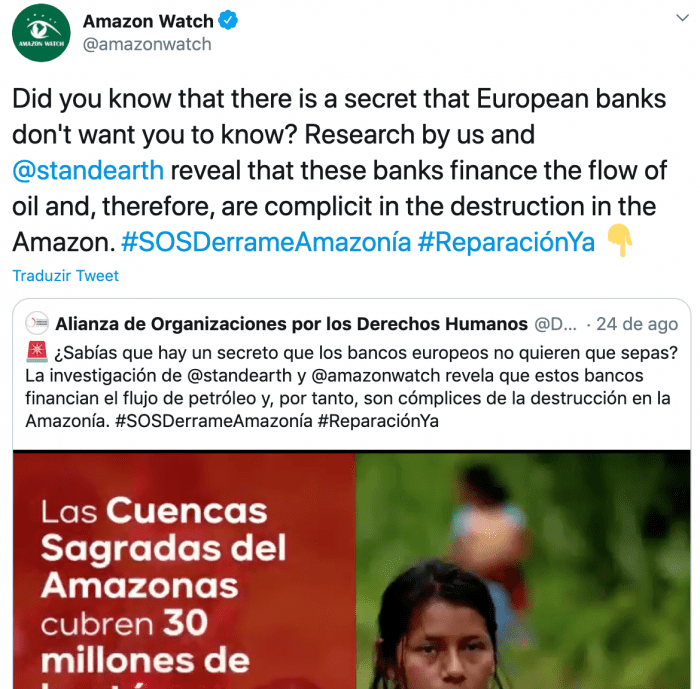In the offices of some of the largest European banks in Geneva, Paris or Utrecht, it must be difficult to find employees dressed in leather chaps or with embroidered cloaks covering their hair and mouth.
However, if the clothes of Spanish colonizers from the 17th century are no longer a hit in the corridors of these financial institutions, the attitude of making money by predatorily exploiting vast areas of Latin America and harming the Indigenous Peoples of the region remains in fashion as of 2020.
This is what we at 350.org concluded by reading the report “European banks financing trade of the controversial Amazonian oil to the US“, released in August 2020 by the NGOs Amazon Watch and Stand.Earth.

The survey reveals that six European financial institutions were responsible for 85% of all bank-financed trade of oil extracted from the Amazon Sacred Headwaters, in Ecuador, since 2009. This is one of the most sensitive areas of the largest tropical forest in the world.
These findings highlight the hypocrisy of these companies, which advertise their environmental and social commitments to the European audiences but profit from irresponsible practices in Ecuador.
ING Belgium, Credit Suisse, Natixis and 16 other well-known commercial banks like to make a big deal of their environmental and social commitments in front of their European customers. But abroad, they profit from destruction. It’s time to expose and end this hypocrisy.

How do these banks practice climate colonialism?
Basically, while preaching climate action in Europe, European banks keep financing corporations who dig for fossil fuels in the Amazon. Oil and gas projects funded with European money make the global climate crisis worse, threaten the vulnerable Indigenous communities and destroy the natural environment. What they don’t dare do in their European lands (at least openly), they do overseas. For these banks, it’s a win-win: they can collect the profit and then go home, leaving the local population to deal with the social and environmental impacts. That sounds exactly like what the ancient colonists did.
This double standard was detailed by Amazon Watch and Stand.Earth in their report:
- At least 19 banks finance trade of oil extracted from the Amazon Sacred Headwaters. The top six banks in this group, all of them from Europe, account for 85% of the credit for this type of trade.
- They are, in order of participation:
– ING Belgium (Branch in Geneva)
– Credit Suisse (Branch in Geneva)
– Natixis (Branch in Paris)
– BNP Paribas Suisse (Branches in Geneva and Paris)
– UBS (Branch in Geneva)
– Rabobank (Branch in Utrecht, Netherlands)
- Since 2009, private financial institutions have provided trade financing for approximately 155 million barrels of oil from the Amazon Rainforest in Ecuador to refineries in the United States, worth about $10 billion USD.
- Even more serious, though, is that these banks often have direct participation in the trade, including in the physical delivery of the oil. The report says:
“By financing Amazon crude oil commodity trades, the banks provide their clients with in-depth knowledge and expertise of the supply chains, actors, and liabilities, and a proven track record of supplying the credit needed to get Amazon oil to U.S. refineries. Trade financing enables the global trade of Amazon crude by building bridges between buyers and sellers that have different needs, risks, time horizons, and incentives. Trade financing often requires banks to take physical delivery of crude oil, which is crucial in enabling traders to manage and hedge their risks. Taking delivery means that banks are consignees on customs documents…”
What is the problem with financing this type of trade?
The environmental and social impacts of oil trade are terrible – and the European banks who provide the funding carry part of the responsibility.
For the climate
- The oil extracted from the Amazon Sacred Headwaters and exported to the US since 2009 contained approximately 66 million metric tons of CO2, equivalent to the annual emissions from 17 coal-fired power plant,
- Banks operating in rich European countries are profiting from the worsening climate emergency, which affects everyone on the planet, but which disproportionately impacts the poorest families and vulnerable communities.
For Indigenous Peoples
The region known as the Amazon Sacred Headwaters, from which the oil was extracted, extends over almost 30 million hectares of the Amazon Rainforest of Ecuador and Peru and is home to more than half a million indigenous people, from over 20 different nationalities. Many of these communities have been suffering for decades from oil spills and the intimidation that falls on leaders who speak out against oil extraction. A recent example:
In April 2020, as the people of Ecuador were going through difficult times because of the Covid-19 pandemic, residents of the region of the Sacred Headwaters also had to deal with the worst oil spill in the region in 15 years, caused by a pipeline rupture. The contamination reached hundreds of miles from two of the main rivers in the region and damaged the water and food supply, as well as the income of Indigenous communities. About 120,000 people were affected, of which at least 27,000 are Indigenous. Local residents also reported health problems, including skin diseases resulting from contact with the river water, which is the only source of bathing and cooking water for several families. The leak also hindered the prevention of Covid-19, since one of the main measures to prevent the virus is to wash hands frequently.
For biodiversity
The region from which the oil is extracted is one of the most biodiverse forest areas on the planet and harbors some of the most important springs of the Amazon River.
The oil sector’s disrespect for the Indigenous People of Ecuador goes back decades and had already been recorded, in February 2020, in the 350.org report on Human Rights Violations by Fossil Fuel Companies.
Can these banks do anything to avoid colonialist practices?
European banks must take a hard look at their predatory practices, and act to stop their neo-colonial business dealings in Latin America. The Amazon Watch and Stand.Earth report offers a number of recommendations, among them these two:
* Promote transparency in any financing for trade in extractive products
* Ensure that all financing for projects or commercial transactions is only released with proof of practices that allow the free, prior and informed consent of Indigenous Peoples, as provided for in Statement 169 of the International Labor Organization (ILO).
At 350.org, we also ask these European banks: why not stop financing oil anywhere and under any conditions? Fossil fuel extraction brings direct harm to Indigenous Peoples and their environment, and indirectly harms all of us by driving climate breakdown and putting our futures at risk.
Banks that claim to be sustainable should have already stopped profiting from the environmental and social disaster that awaits us if we don’t stop emitting CO2 immediately.
More than the clothes, this attitude is what would differentiate them from the European colonists that explored Latin America four centuries ago.